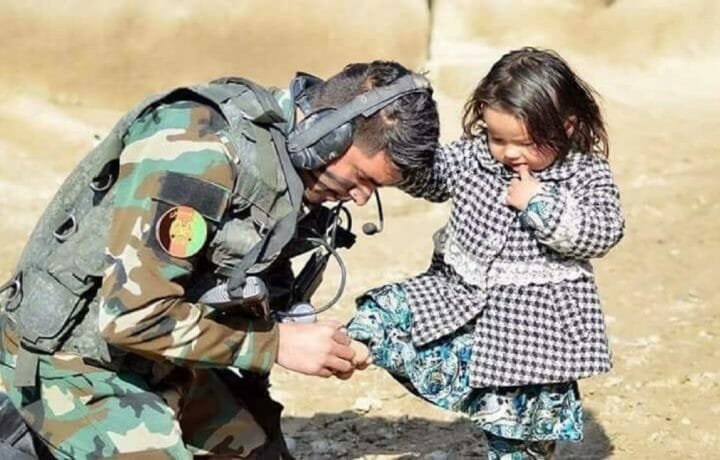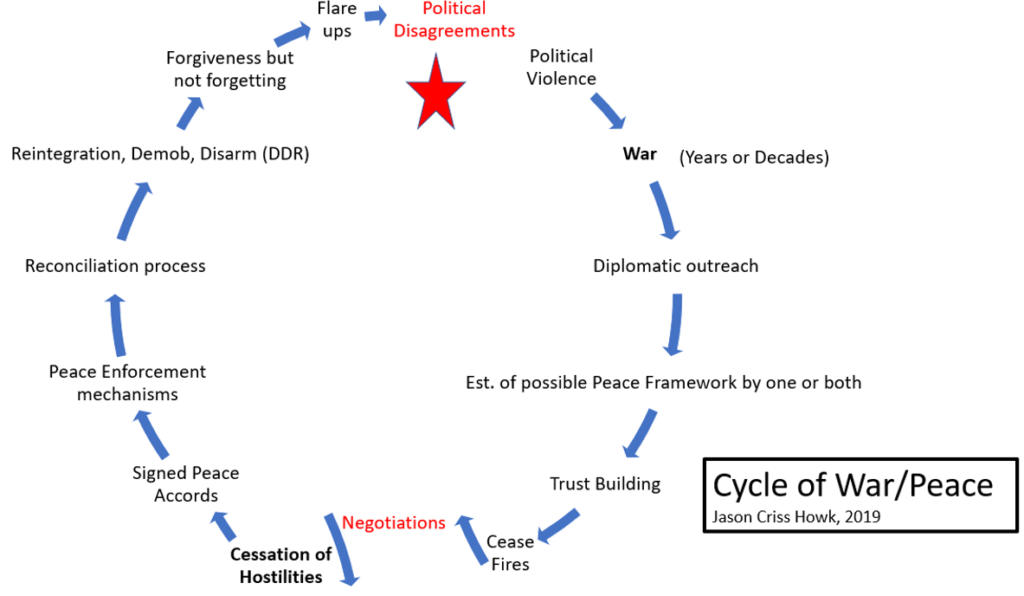Just before the announcement of the U.S.-Taliban agreement finalization last week I was at a multi-national conference discussing the American-led efforts that stopped the most recent Pakistani hybrid warfare campaign against the Afghan government and people (2001-present). Since 2002, when I was asked what needed to be done to improve Afghanistan, I always said start with Pakistan. So, I will here today.
Some major announcements came from the Pakistan delegation in this open forum. The Afghan delegation sat right across from them at the table when these points were made by the Pakistani generals in attendance. First, the Pakistani’s admitted they have been controlling the Taliban from its formation in the early 1990s until today. This admittance on the first day of the conference led to many honest and useful discussions between the Afghan and Pakistani delegations during the week. We all concluded after my comments that every nation involved in Afghanistan had made huge mistakes, with bloody consequences. We also all concluded it was time to look past the mistakes of previous years and think about what our grandchildren needed the current leaders in the region to do.
Second, the Pakistani’s admitted their three attempts at using a proxy to take over the Afghan government have all failed (1980s proxy was Hekmatyar, 1990s the Taliban movement, 2001 to present new and old Taliban and their allies). Acknowledging that military manipulation of the Afghan people is not a feasible or rational goal for Pakistan was a big step and one that can be built upon in international forums and bilateral discussions with Pakistani leaders. Having Pakistani generals publicly admit that unconventional warfare against Afghanistan is not a productive way to get what they want from the Afghans is a useful moment.
Third, the Pakistani delegation explained to their regional partners that when they look at national security in Pakistan today, their existential threat is not India or Afghanistan, but their dismal economy. The Pakistanis dropped the hint numerous times that they sought economic partners, and that China was a partner willing to invest, not a friend to the Muslim world. This might open the door for the world to use more carrots than sticks to get Pakistan to change its strategic calculus and stop trying to manipulate the future of Afghanistan.
A telling moment in the Pakistan level of control over the Taliban movement was when we discussed the idea of closing Taliban safe-havens in Pakistan, the generals vented passionately that they had just given the U.S. the peace deal they had asked for. They then asked what more did we want from the Pakistani Army. Those in the room did remind Pakistan that the world wanted them to cut ties with all terrorists, too.
Entering the US-Taliban peace negotiations
Now the Afghan government, the U.S. and the Taliban movement have started the clock on the process towards peace. At midnight in Afghanistan, the forces on all sides began a reduction of violence. This means no suicide attacks, indirect fire, raids, or other forms of attacks will occur against civilians, cities, military installations or known Taliban positions.
If the Taliban can earn a bit of trust from the international community by holding to a seven-day temporary cease fire, then the next phase of the U.S.-Taliban talks will begin. This includes signing a document that locks in the plan, starting direct talks between the legitimate Afghan government and the Taliban insurgent movement, the Taliban cutting ties with terrorists, and some prisoner exchanges. All this is meant to build further trust amongst the parties that can lead to a durable Afghan peace process. If there is measurable progress in the Afghan peace process America (and likely other Afghan allies) will begin withdrawing military forces.
As I like to point out to my political science and national security students, peace and war are interconnected and violence operates in a cycle. This chart shows us how far we have come and how far we have to go. I have been advising for nearly two decades that the hardest part is yet to come: reconciliation, reintegration, and forgiveness will exact a lot from the Afghan people. Combat and violence will seem like the easy phase soon. The world must be ready to support them.
There are many ways the world can help the Afghan people now. The military is just one tool for peace-building but it is often vital for ending wars and securing the peace. Using this La Medici model we can see all the other tools nations have to assist.
Legal | Aid-development-education | Military: advisors, security cooperation relationships, and combat power | Economic | Diplomacy | Intelligence operations | Cyber capabilities | Information operations
Afghans must seize this moment to enter peace talks wisely and leave their nation stable and free. It would help immensely if those who lost the presidential election joined in support of the Ghani Administration; disunity now only strengthens the taliban’s leverage in talks. The Afghan military and police need to continue to respect the Afghan citizens and retain the respect of the Afghan people towards them. Professionalism will be their greatest strength as the peace process moves forwards and flows of refugees, former taliban fighters, and criminals come home to rejoin the modern Afghan society. These will be trying times and the Afghan people will lean heavily on their security forces for fairness, law & order, and security for the most vulnerable. Corruption and illegal networks must also be dealt with by the Afghan people during this long peace process, they are forces that will destroy credibility and trust in the government at a time it is desperately needed.
Finally, the Afghan government must develop strong strategic communication habits during the peace process. The Taliban forces are masters of propaganda and unfortunately have a large array of news outlets willing to let them lie at will (ask the NY Times about this). The Afghan government must trust all its elected leaders, cabinet members, generals, ambassadors, and liaisons to speak openly, honesty, and most importantly quickly to counteract taliban propaganda. If the Afghan government overly-centralizes its strategic communications to the Arg and fails to utilize the Western press effectively, the taliban will make significant gains in the peace talks. Besides losing leverage in peace talks, any weakness by the Afghan government in telling its side of the story will likely cause foreign donors and investors to withhold possibly billions of dollars because they do not want to throw any more money at a government that cannot stand up for itself against human rights abusers and terrorists. Information operations are the most important tool in this phase of the war for the Afghan government. The media outlets of the world can help the Afghan people in this area by ensuring they don’t print lies and they use interviews with terrorists and human rights abusers to push back on propaganda.
What to watch in the peace process
We should all be realistic now; there will be backsliding and cheating from the Taliban and their allies in Pakistan. If you go in expecting this, you won’t be disappointed when you realize the Taliban might not be interested in peace yet. This is a process. We have just entered the final phase of a 40-year violent nightmare for the Afghan people. Afghans have entered this phase before and the civil war among the former-mujahedeen resulted from the last failure.
The main things to watch now are Afghan military and police capability and professionalism. If they can hold the security of the nation together as the international forces depart that is a good sign. If the ANDSF stays loyal to the Afghan government and the semi-retired warlords don’t rebuild their militias things will be going okay. If the Taliban fighters steadily leave their formations and go home, the Afghans are on the right path. If Taliban leaders start to enter political positions and cut their ties with terrorists and the Pakistan ISI things are on track. If the international community continues to work with Afghan security forces to dismantle ISIS and other terrorist groups, that is the right direction. If we can even get Pakistan to start to counter all terrorists in the region, that will be huge progress, and speed up the Afghan peace process. If we see that human rights for all is being upheld in all talks and agreed to in all documents, we will be preserving the most precious gains since 2001.
Many things can go wrong; not all areas will see progress. The key is to continue to support the Afghan people via the Afghan government and through direct economic, education, healthcare, and human rights relations with the Afghan citizens. They will need these soft investments and more to undo four decades of destruction.
Where this all began
When I began assisting the Afghan government to gain international consensus on an Afghan-led and Afghan-owned peace process with its regional enemies, I heard one resounding idea from almost everyone person we discussed this with. That refrain was, “this will never work, the Taliban will never talk about peace, and Pakistan will never allow this to start.” That was in August of 2009 when Sir Graeme Lamb was asked to work with the Karzai administration to see what was feasible. Luckily Ambassador Holbrooke was a very willing partner, and together they supported Minister Masoom Stanekzai to convince the world to help Afghanistan start down the path to peace. Little more than a decade later the Afghans have arrived at a chance for peace. Many have angled for Nobel peace prizes for their work along the way, but let us hope the Afghan people can send a young girl to stand on that stage in the coming years to accept it on behalf of all the Afghan sacrifices.
I want the Afghans to now take complete control of their peace process. The international community has done all it can, often clumsily, to get the warring parties in the room together. The international community must continue to support the Afghan people in this quest for peace and also for human rights. There can be no back-sliding on the progress the Afghan people have made since the ouster of the illegal Taliban regime that was installed by Pakistan. Remember, this is a process that has taken decades to resolve in other nations. But I suspect this phase of the peace process Afghans so dearly want will go much faster and possibly smoother than most think. Afghans deserve peace, and the world owes them a lot for fighting on the front lines of terrorism for so long.





